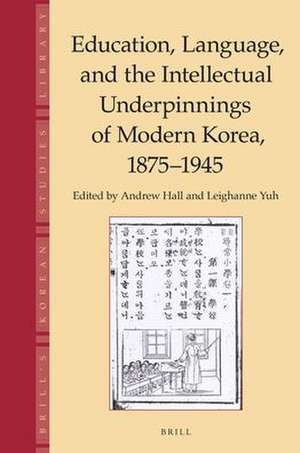Education, Language and the Intellectual Underpinnings of Modern Korea, 1875-1945: Brill's Korean Studies Library, cartea 6
Editat de Andrew Hall, Leighanne Yuhen Limba Engleză Hardback – 14 dec 2022
Preț: 526.49 lei
Preț vechi: 619.41 lei
-15% Nou
Puncte Express: 790
Preț estimativ în valută:
100.78€ • 109.50$ • 84.71£
100.78€ • 109.50$ • 84.71£
Carte indisponibilă temporar
Doresc să fiu notificat când acest titlu va fi disponibil:
Se trimite...
Preluare comenzi: 021 569.72.76
Specificații
ISBN-13: 9789004512542
ISBN-10: 9004512543
Pagini: 240
Dimensiuni: 160 x 240 mm
Greutate: 0 kg
Editura: Brill
Colecția Brill
Seria Brill's Korean Studies Library
ISBN-10: 9004512543
Pagini: 240
Dimensiuni: 160 x 240 mm
Greutate: 0 kg
Editura: Brill
Colecția Brill
Seria Brill's Korean Studies Library
Notă biografică
Andrew Hall, Ph.D. (2003), University of Pittsburgh, is an Associate Professor of history at Kyushu University. His scholarship focuses on Japanese colonial education in China and Korea, including “First Steps towards Assimilation: Japanese-Run Education in Korea, 1905-1910,” (Acta Koreana, 2015).
Leighanne Yuh, Ph.D. (2008), University of California at Los Angeles, is an Associate Professor of Korean History at Korea University. Her primary research interest is in intellectual and educational history in the periods of nation-building (late Chosŏn and Open Ports, roughly 1876-1910) and the colonial era and she has published numerous articles on this topic, including, “Korean Female Education, Social Status, and Early Transitions, 1898-1910,” (Korea Journal, 2021).
Leighanne Yuh, Ph.D. (2008), University of California at Los Angeles, is an Associate Professor of Korean History at Korea University. Her primary research interest is in intellectual and educational history in the periods of nation-building (late Chosŏn and Open Ports, roughly 1876-1910) and the colonial era and she has published numerous articles on this topic, including, “Korean Female Education, Social Status, and Early Transitions, 1898-1910,” (Korea Journal, 2021).
Cuprins
List of Figures and Tables
Notes on Contributors
Introduction: Knowledge Production in the Struggle for Power and State Formation in Korea, 1875–1945
Andrew Hall and Leighanne Yuh
1 Linguistic Modernity, Education, and Nationalizing the Vernacular in Pre-colonial Korea: Divergences between Western Missionary and Indigenous Discourses
Daniel Pieper
2 Legitimizing Literary Sinitic in Korea’s Pre-colonial Classroom: Yŏ Kyuhyŏng and the Publication of Hanmunhak kyogwasŏ
W. Scott Wells
3 Late Nineteenth-Century Modern Education in Korea: The State, Ideology, and Moral Education
Leighanne Yuh
4 Official Foreign Language Schools in Korea, 1894–1906
Yong-Jin Hahn
5 Japan’s Education Policies in Korea in the 1910s: “Thankful and Obedient”
Andrew Hall
6 The Construction of Elementary Education in Early Colonial Korea: Non-compulsory Education and Japan’s Dissemination of Schools
Furukawa Noriko
7 Korean Language Textbooks, 1895–1932: Mixed Script, Hanmun, and Colonization
Lim Sang-Seok
8 History Education in Colonial-Era Korea: The Rise and Fall of Chōsen Jireki as Local History
Kokubu Mari
9 Korean Reactions to Japanese Education Policy under Cultural Rule, 1920–1931
Mark E. Caprio
10 “The Spirit of Our Students, Our Children!”: Korean Student Identity and the 1919 March First Movement in The Grass Roof and The Yalu Flows
Deborah B. Solomon
11 Christianity, Western Modernity, and the “Third Space” in Colonial Korea: The US-Educated Elite and the Quest for Democracy
Yoonmi Lee
Index
Notes on Contributors
Introduction: Knowledge Production in the Struggle for Power and State Formation in Korea, 1875–1945
Andrew Hall and Leighanne Yuh
Part 1: Education and Language Issues in Late Chosŏn
1 Linguistic Modernity, Education, and Nationalizing the Vernacular in Pre-colonial Korea: Divergences between Western Missionary and Indigenous Discourses
Daniel Pieper
2 Legitimizing Literary Sinitic in Korea’s Pre-colonial Classroom: Yŏ Kyuhyŏng and the Publication of Hanmunhak kyogwasŏ
W. Scott Wells
3 Late Nineteenth-Century Modern Education in Korea: The State, Ideology, and Moral Education
Leighanne Yuh
4 Official Foreign Language Schools in Korea, 1894–1906
Yong-Jin Hahn
Part 2: Japanese Colonial Education: Plans, Schools, and Textbooks
5 Japan’s Education Policies in Korea in the 1910s: “Thankful and Obedient”
Andrew Hall
6 The Construction of Elementary Education in Early Colonial Korea: Non-compulsory Education and Japan’s Dissemination of Schools
Furukawa Noriko
7 Korean Language Textbooks, 1895–1932: Mixed Script, Hanmun, and Colonization
Lim Sang-Seok
8 History Education in Colonial-Era Korea: The Rise and Fall of Chōsen Jireki as Local History
Kokubu Mari
Part 3: Korean Responses to Colonial Rule
9 Korean Reactions to Japanese Education Policy under Cultural Rule, 1920–1931
Mark E. Caprio
10 “The Spirit of Our Students, Our Children!”: Korean Student Identity and the 1919 March First Movement in The Grass Roof and The Yalu Flows
Deborah B. Solomon
11 Christianity, Western Modernity, and the “Third Space” in Colonial Korea: The US-Educated Elite and the Quest for Democracy
Yoonmi Lee
Index





